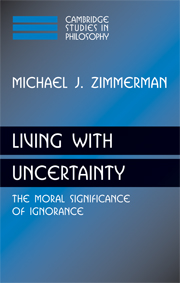3 - Prospective possibilism
Published online by Cambridge University Press: 22 September 2009
Summary
In chapter 1, I argued against the Objective and Subjective Views of overall moral obligation and in favor of the Prospective View, but I formulated none of these views with any precision. In the last chapter, I pursued my defense of the Prospective View, extending my discussion to include an account of prima facie moral obligation and of moral rights, and in so doing provided a somewhat more precise formulation of the view. But in fact that formulation (the seventh) is still very rough, and it is now time to attend to the matter of developing the Prospective View in detail. In order to accomplish this, I will begin by discussing a debate that has recently taken place within the camp of those who subscribe, not to the Prospective View, but to the Objective View. This debate concerns the question of what exactly it means to say that one ought to choose that option that is actually best. Perhaps the most natural way of understanding what this means (it is certainly the way in which archetypical Objectivists such as G. E. Moore understand it) is that of the Actualist, but this understanding gives rise to a host of difficulties. An alternative construal, that of the Possibilist, avoids these difficulties but faces problems of its own. These are matters that I will discuss in section 3.1.
- Type
- Chapter
- Information
- Living with UncertaintyThe Moral Significance of Ignorance, pp. 118 - 168Publisher: Cambridge University PressPrint publication year: 2008



